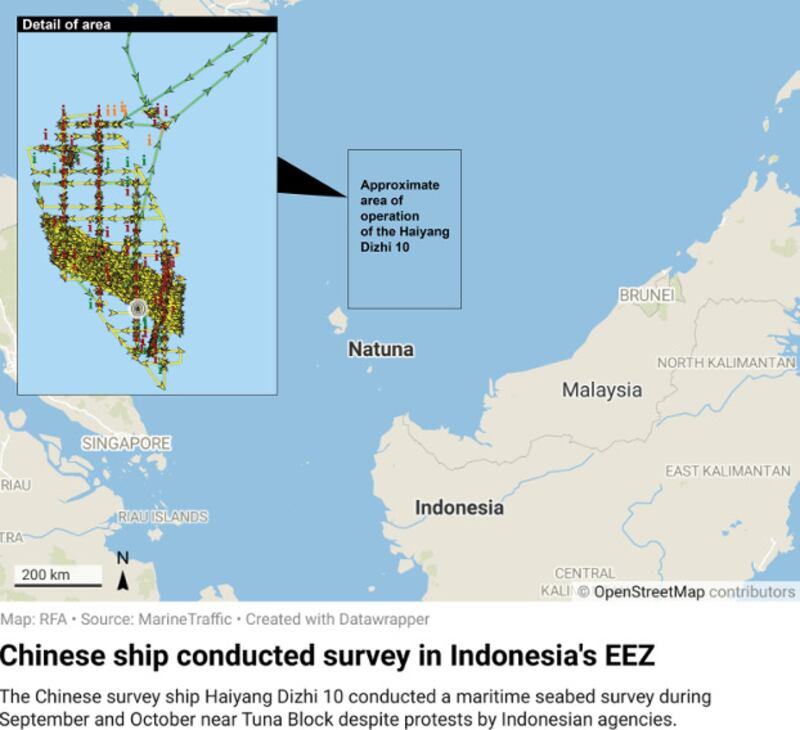The Group of Seven industrialized nations has voiced concern over tensions in the South China and declared “shared interest in maintaining a free and open Indo-Pacific region” after an inaugural meeting of G7 foreign ministers with their counterparts from ASEAN.
The G7 comprises the United States, United Kingdom, France, Germany, Italy, Canada and Japan. Its top diplomats meeting in Liverpool, England, held a videoconference Sunday with counterparts of the Association of Southeast Asian Nations.
The meeting was hosted by the U.K. which holds the G7 chairmanship this year.
The chair's statement said G7 and the 10-member ASEAN bloc discussed the situation in the South China Sea and "concerns were expressed on the land reclamations, activities, serious incidents in the area, including damage to the marine environment, which have eroded trust and confidence, increased tensions, and may undermine peace, security, and stability in the region." The statement stopped short of naming any specific country.
China, which has been accused of such activities, was not invited to the meeting and has not yet responded to the statement, which was also posted on the ASEAN secretariat's website.
The participants called for “an effective and substantive Code of Conduct in the South China Sea that is in accordance with international law, including the 1982 UNCLOS (United Nations Convention on the Law of the Sea).”
The ministerial meeting was called amid division among ASEAN members about AUKUS, a new trilateral partnership among the U.S., U.K. and Australia which has been criticized by China as potentially stoking a nuclear arms race in Asia.
Malaysia and Indonesia have expressed concerns about the new alliance that would eventually see Australia acquiring nuclear-powered submarines – although not nuclear weapons – from the U.S. and the U.K.
Just a few days before the meeting, Indonesian Defense Minister Prabowo Subianto reiterated his country’s position on AUKUS “is that of course Southeast Asia should remain nuclear free, and the fear among Southeast Asian nations is that this will spark an arms race.
Carl Thayer, emeritus professor at the University of New South Wales, said Sunday’s meeting was held at the U.K.’s initiative and it could reflect the direction of British foreign policy.
“It was the United Kingdom exercising its prerogative as the chair of the G7 and that it has its own independent policy toward the Indo-Pacific,” Thayer said.
In March, the U.K. government outlined its security, defense, development and foreign policy for the next two decades. Observers said there was a clear “tilt to the Indo-Pacific.”
This summer, its flagship aircraft carrier HMS Queen Elizabeth deployed for the first time to the South China Sea.
U.K. Defense Secretary Ben Wallace said the deployment demonstrated “British power and commitment at sea, in the skies and over the land” while furthering the U.K.’s interests and strengthening its partnerships.
Oil and gas production plan
Meanwhile, in a move likely to annoy China, Harbour Energy, a U.K. oil and gas company, announced that a production plan is being put together after successful drilling in two blocks off the shore of Indonesia.
The company said on Dec. 9 that a successful appraisal drilling campaign in Natuna Sea Block A and Tuna Block would be "supporting future production."
Harbour did not provide details but local media in Indonesia quoted Benny Lubiantara, deputy planning officer of the government’s special task force for upstream oil and gas business activities, as saying that his department and Premier Oil would begin to discuss a proposed plan of development in January 2022.
Premier Oil is Harbour’s operational name in Indonesia. It merged with Chrysaor to become Harbour Energy plc in 2021.
With the Russian partner Zarubezhneft it drilled two appraisal wells in East Natuna Sea on the Indonesian border with Vietnam which show hydrocarbon potential.
“Since the beginning, SKK Migas has categorized the two wells as key wells,” Benny said. “In addition to increasing national oil and gas reserves, these findings also emphasize the territorial sovereignty of the Republic of Indonesia.”
Earlier this month, an Indonesian lawmaker revealed that Beijing demanded that Indonesia stop oil and gas drilling in Tuna Block.
The bloc lies inside Indonesia’s exclusive economic zone (EEZ), about 10 nautical miles from the Indonesia-Vietnam maritime border but overlaps with the nine-dash line that Beijing uses to demarcate its territorial claims in the South China Sea.
For two months in September and October, a Chinese survey ship – Haiyang Dizhi 10 – was conducting a seabed survey near Tuna Block despite protests by Indonesian agencies.
Meanwhile, U.S. Secretary of State Anthony Blinken begins a two-day visit on Monday to Jakarta.
Prior to the visit, his office issued a statement saying the U.S. "support(s) Indonesia's strong efforts to safeguard its maritime rights and stand up to PRC (China) aggression in the South China Sea, including in its exclusive economic zone around the Natuna Islands."

